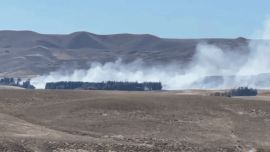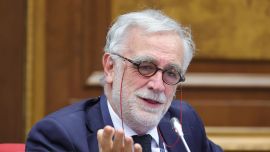At the Posadas Hospital in El Palomar, the biggest in Argentina, all the intensive therapy beds are occupied. After six months of attending coronavirus patients, staff here are exhausted.
Alberto Maceira, the hospital’s director, wants the population to be individually responsible to avoid saturation of the system.
“Our operational capacity has reached its limit, we cannot increase it any more. This is a pandemic which is not simply handled by the health system, it’s very important that the country understands that it has to look after itself because otherwise the health system will not be able to respond,” Maceira told AFP in a video interview this week.
Argentina has accumulated over 678,000 confirmed cases of Covid-19 with close to 15,000 deaths, despite quarantine measures being introduced on March 20. Restrictions have been relaxed but for the most part, the lockdown remains in place. At least in theory.
Located on the outskirts of Buenos Aires, the Posadas Hospital has passed from 26 intensive therapy beds to 90. But for the last three weeks they have been totally occupied, with three intensive therapy beds in the paediatric ward also being used by adults.
“Our human resources are clearly very depleted. This greater volume of patients has really doubled the workload of intensive therapists, nurses, cleaning staff, kinesiologists, etc. and they are far more tired,” explains Maceira.
Greater strain
It’s not just about the high numbers of the sick. Costanza Arias, intensive therapy chief at Posadas Hospital, points out the complexity of the patients.
“These patients require a vastly superior effort to usual patients. They are serious cases, all with artificial respiration, all in a state of shock and all requiring a multidisciplinary approach, which is exhausting – above all, because we thought it wouldn’t last so long and it’s stretching out into time,” she said.
“This is not a virus with built-in limits, it keeps expanding and the seriously ill patients keep coming in and I think that it will continue like this for several more months,” she adds.
Although contagion in Buenos Aires City has stabilised in recent weeks, the daily average remains high in four digits and the disease has spread out into provinces still registering a low incidence little over a month ago.
“I note with some concern the expansion [of the virus] in other provinces, which probably have less sanitary capacity,” comments Maceira.
Intensive care
Apart from exhaustion, doctors, nurses and hospital staff have suffered the illness too. Healthcare professionals have a Covid-19 contagion rate of 20-25 percent although most have recovered in two or three weeks and have returned to work, according to Arias.
“We’re tired. You work here and elsewhere and it’s the same strain everywhere,” said Dr. Diego Laplumé, an infectious diseases specialist who works in the triage area of the institution.
“Fatigue is making itself felt and we have to see what we can do about it, whether we do shifts so that the body can recoup energy,” he said. “Because this is not going to stop in the medium term – this will continue.”
– TIMES/AFP

























Comments